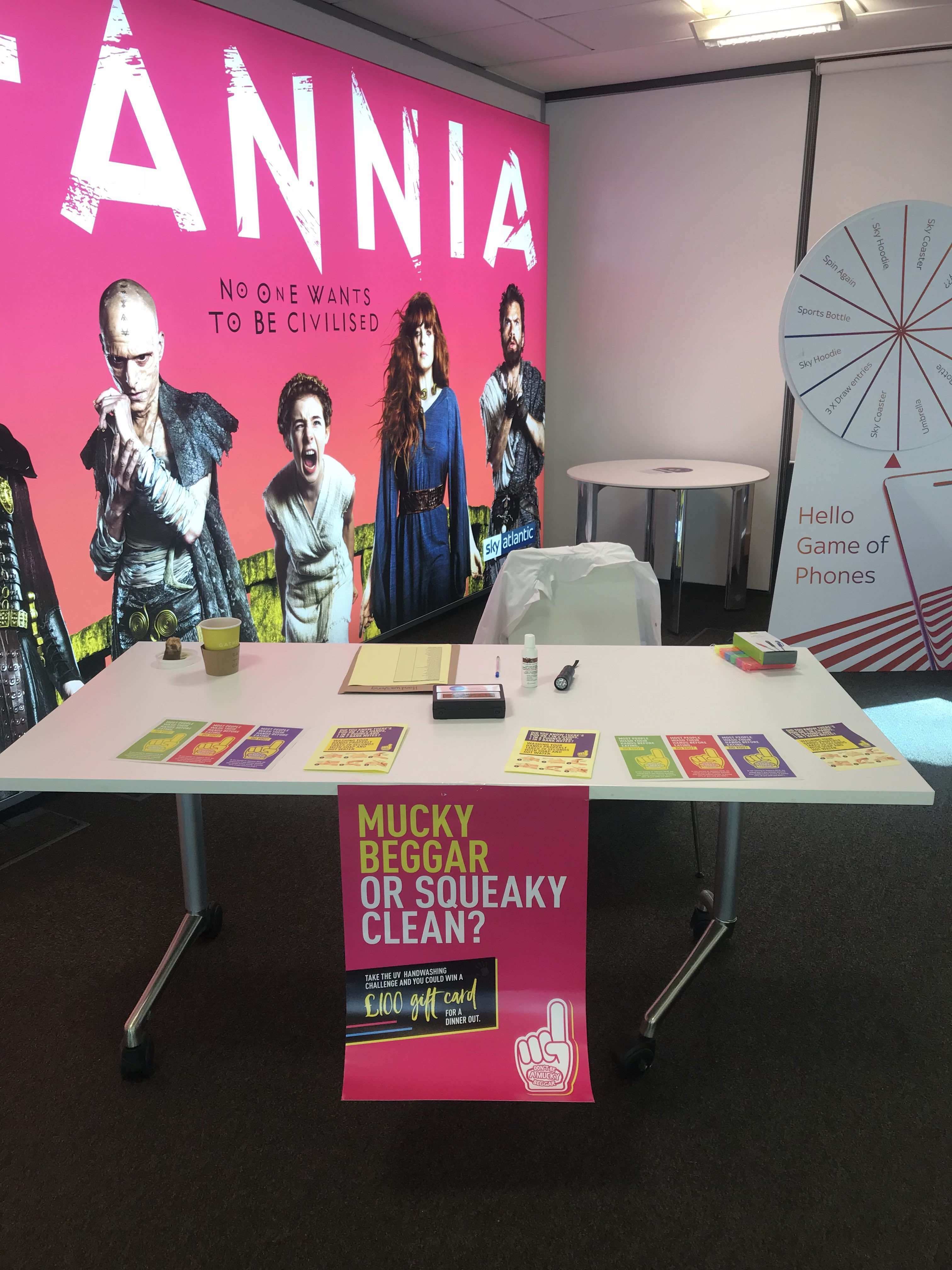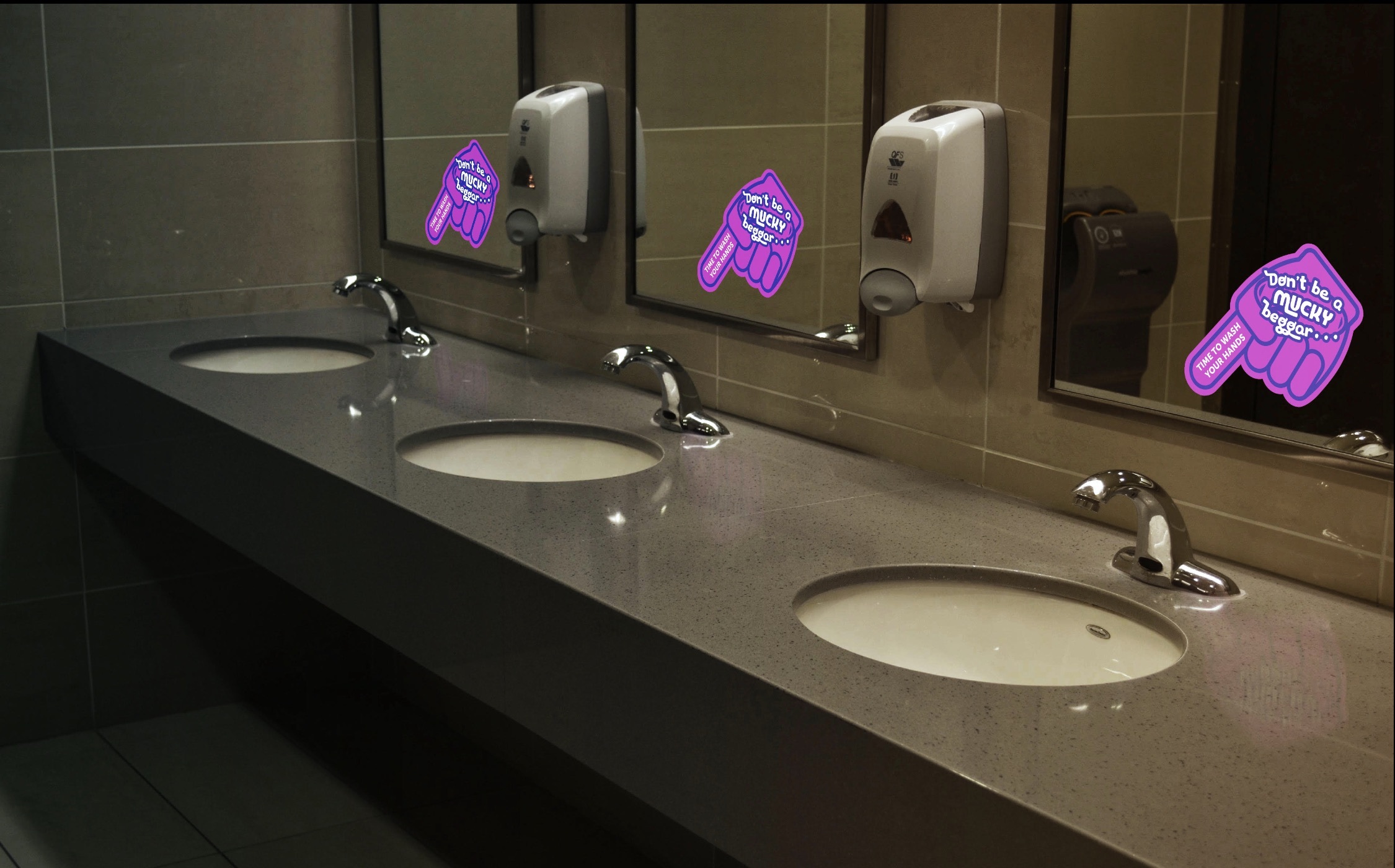Background
Handwashing is a critical yet sometimes overlooked aspect of personal hygiene, especially in workplace environments. Despite efforts to promote this behaviour, statistics indicate persistent lapses in handwashing practices among the UK public. In response to this challenge, this project was born in collaboration with Sky, aiming to improve handwashing behaviour in the workplace. We developed and piloted a behavioural intervention in a call centre in the north of England using the power of social norms to nudge people to wash their hands at key moments throughout the work day.
Insight
Hand washing, people know they should do it and they usually have access to the facilities but there is seemingly a disconnect. Informing our intervention, a 2017 poll of the UK public showed that:
65% do not always wash their hands before eating
32% do not wash their hands before preparing food
21% do not always wash their hands after going to the toilet
At the project’s start, poor hand hygiene contributed to 137m working days a year lost from illness in the UK. Armed with this knowledge, the project commenced with a trial in 2018, collaborating with Sky to test interventions aimed at enhancing handwashing behaviour among employees. A contact centre in the North of England, housing 350 staff members, was chosen for the pilot due to its shared desk environment and higher incidence of gastro-related absences.
Understanding the existing behaviour patterns and challenges within the selected workplace was crucial. Close collaboration with the staff facilitated the development of creative solutions tailored to office life.
We ran an internal survey with staff members to get an isolated picture of hand washing habits that showed different data to the aforementioned national survey. These were the findings:
- 93% claimed to always wash their hands after the toilet
- Only 60% claimed to always wash their hands before eating; office set-up makes this harder
- There was a low awareness of the alcohol gel dispensers
- Real concerns about germs being spread, especially in some teams, as desks/computers are shared
- There is already a lot of signage and important updates to read in the office, meaning that landing new messages is a challenge
- People were more interested in and open to new initiatives to improve hygiene than anticipated
- There were some myths (e.g. no hot water on the 2nd floor) that needed busting to maximise effectiveness.
Intervention
The intervention was built around social norms. From the survey we conducted, the predominant social norm was to wash your hands after going to the toilet so the intervention intended to communicate that norm and encourage people to want to follow the status quo. Thus, using norming messaging such as “most people” and “93% of people”.
We aimed to influence behaviour change through the notion that most people wash their hands, ultimately encouraging those seeing the posters/stickers to follow the norm.
The intervention used the tagline 'Don't be a Mucky Beggar', striking a balance between light-heartedness and boldness. The phrase comes from Sheffield where this intervention took place, and choosing it as the name of the project was born out of co-creation. During a lively conversation with the office staff, one individual spontaneously uttered the phrase, and immediately, it resonated as the perfect title for the project. This tone encouraged conversation while effectively conveying the message.
Implementation
The project employed a variety of nudges and engagement strategies, including:
Interactive competitions to generate excitement and involvement

Eye-catching posters, table-talkers and stickers
These were strategically placed at the moments where one would need to wash hands the most (i.e. before eating, after using the toilet) in the workplace to capture attention and encourage engagement

Simple yet effective communications
Using existing channels, emphasising the importance of handwashing.
Small adjustments to office practices
To address potential objections, such as refilling sanitisers and discouraging eating at desks.
Impact
Gastro-related work absences decreased by 16%
Our findings also showed...
- High visibility and recognition - The project achieved remarkable visibility, with 97% of staff recalling the campaign, and 81% acknowledging its distinctiveness
- Increased awareness and understanding - The campaign significantly improved the understanding of handwashing importance among employees, with knowledge of the recommended 20-second duration rising from 12% to 52%
- Positive behaviour changes - Claimed behaviour changes were observed, particularly regarding hand washing before meals
- Engagement and conversation - Focus groups indicated that the campaign successfully sparked conversations about hygiene, fostering a culture of awareness and accountability